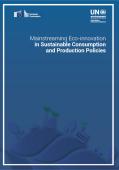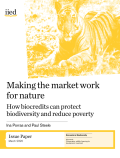
This report identifies some of these barriers, and specifically those originating from the policies in place that determine the context in which companies operate. It helps policymakers better understand the benefits of eco-innovation and the contribution it can make towards sustainable development and national objectives.
This roadmap aims to describe, when possible, the main overarching goals, steps and agenda that the Building sector as a whole could share, creating the framework of a common vision for low GHG and resilient global real estate pathways.
The organizations Environmental Finance, Finance for Tomorrow, Global Landscapes Forum, Mirova and IDH – The Sustainable Trade Initiative organized three events in November 2019 dedicated to exploring ways of investing in natural capital. These events aimed to create common ground and understanding about natural capital investments, help build a track record for investors, and foster partnerships among stakeholders. This Outlook 2020 builds on that experience, in order to share recommendations for actions to enable systemic change in a joint outcome.
These guidelines are primarily written for government agencies who wish to take a common stepwise approach to measure Sustainable Public Procurement (SPP) actions and policies in their country. They are designed both for beginning countries, as well as for those who already have an SPP plan in operation and who would like to improve and report on it in the context of the SDG 12.

Tackling biodiversity loss is a growing priority for human survival. Introducing incentives for positive actions could play a key role in helping to reverse this loss. This paper explores the potential of using a novel approach to promote biodiversity conservation. It explains the concept of biodiversity credits or ‘biocredits’, describing them as coherent units of measurement that track conservation actions and outcomes and can help improve tracking and transparency.
